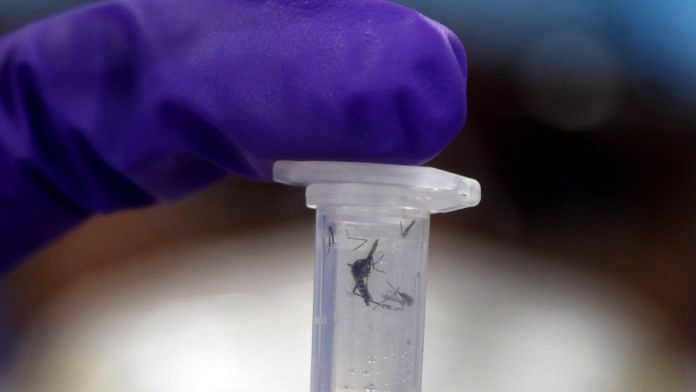Puducherry: Starting this academic year, India will have a total of five institutions offering an MSc Public Health Entomology — a course for specialisation in the study of vectors and vector-borne diseases such as malaria and dengue.
The Regional Medical Research Centres in Gorakhpur and Dibrugarh, the Patna-based Rajendra Memorial Institute of Medical Sciences, and the National Institute for Research in Tribal Health, Jabalpur, will all begin offering the course, Dr Ashwani Kumar, the director of Vector Control Research Centre (VCRC) in Puducherry, told ThePrint.
The VCRC, which comes under the Indian Council of Medical Research (ICMR), is the only institution that offers the course at the moment.
Vector-borne diseases are infections transmitted by the bite of infected arthropod species, such as mosquitoes, ticks, triatomine bugs, sandflies, and blackflies.
The VCRC was established in 1975. It’s engaged “in basic and applied research with the primary objective of finding newer methods and developing strategies of vector control for the control of vector-borne diseases”, according to its website.
The institution has been offering the course since 2011.
The latest development would mean that the number of seats for the course would go up to 68, from 8 as of now. This, doctors say, will help deal with the paucity of trained entomologists in India.
Kumar said “the control of vector-borne diseases is not very difficult”.
“But the problem is that municipal authorities swing into action only when the disease is on the upswing,” he added. “The problem also is we do not have enough entomologists in the country. That is why from this year we are increasing our seats from 8 to 20. The course will [also] start in four other institutes.”
The plan is to eventually increase the total number of seats to 100.
In addition, the VCRC now plans to earn money by patenting its new equipment, Kumar said.
Also Read: ICMR institute finds human-to-animal TB bacteria transmission in India, plans screening of pets
‘Lack of trained entomologists’
Public health entomology focuses on the population biology of vector-borne infections, seeking to understand how such pathogens perpetuate over time and attempting to devise methods to reduce the burden they impose on human health, according to a 2001 paper.
A plan of the National Vector Borne Disease Control Programme to appoint entomologists — a person trained to study vectors and predict the public health implications of conditions conducive to their growth — in each of India’s now-755 districts is still hanging fire for want of trained personnel, Dr S. Sabesan, an adjunct professor at the VCRC, told ThePrint.
With an annual budget of approximately Rs 43 crore, the Indian Council for Medical Research is the foremost centre for research on vectors in the country. It also has a mosquito museum and a huge collection of vectors and pathogens.
Explaining the role of an entomologist, Sabesan said: “We collaborate with multiple departments to predict and understand outbreaks. We get GIS data from the Indian Space Research Organisation (ISRO) regularly to plot the vector density and that data is then validated by external agencies. You need a trained entomologist on the field to understand the difference between the footprint of similar or closely related vectors.”
Patent applications
The VCRC has developed a number of scientific equipment for use in vector research in the field and in the laboratory, Dr Kumar said.
These include contraptions to catch, store and kill mosquitoes, a larvicide that is now being manufactured commercially, and a protein gel plasmapheresis machine that costs a fraction of what’s currently available in the market. Many of these are pending patents.
“For many years, we were asked to stay away from any monetary transactions but now we are asking our researchers to develop and patent new equipment and earn money for the Government of India,” Kumar said. “The researcher will get 1-2 per cent royalty.”
(Edited by Uttara Ramaswamy)
Also Read: Gluten to dairy—why is everyone having food intolerance? Say thanks to Dr Google



